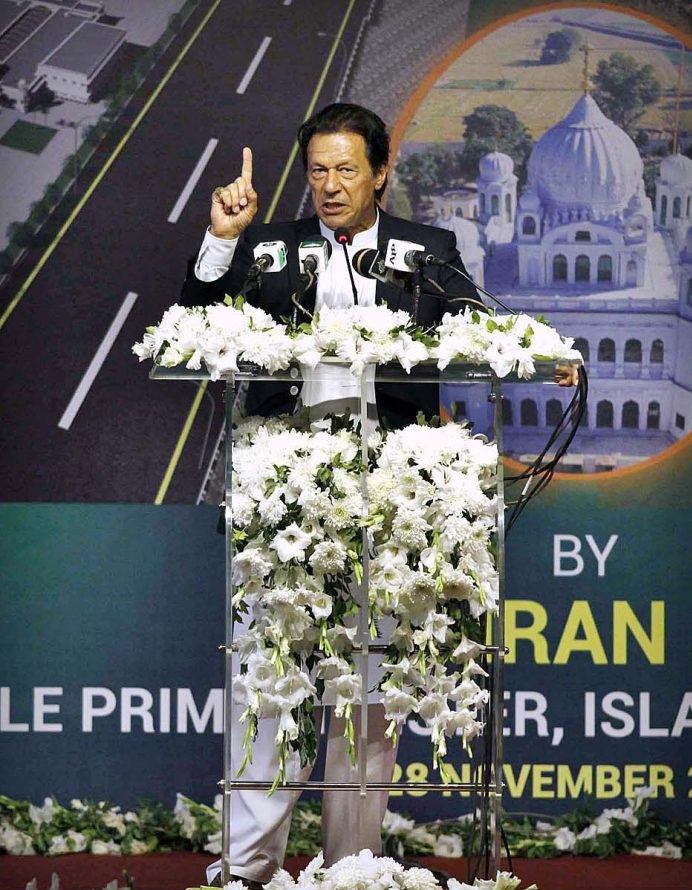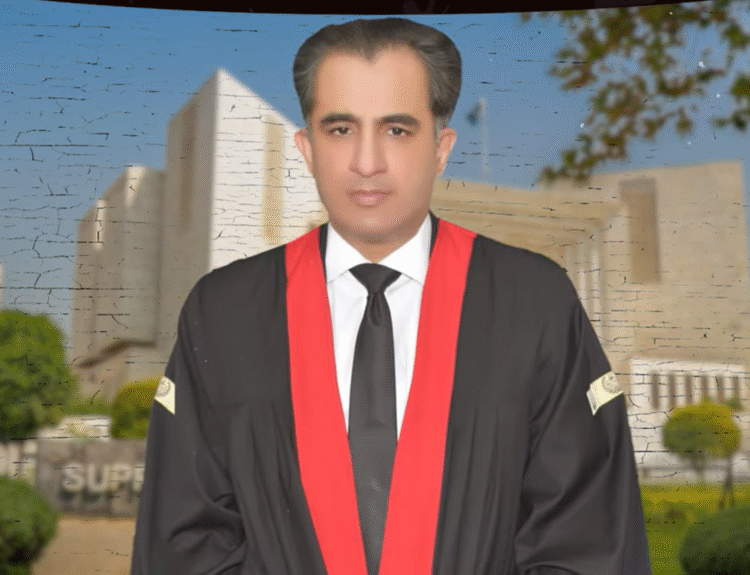By Khalid Hussain
The new government has scored a diplomatic victory when India refused recent Pakistani overtures for peace. In refusing to talk to Pakistan, India has lost face despite both countries breaking new ground on the visa-free Kartarpur corridor in Pakistan for Sikh Pilgrims from Indian Punjab. Yet, peace talks remain suspended as India continues to act belligerently and the two nuclear countries still remain at logger’s heads. India has proven as obstinate as always.
The opening of the Kartarpur project promises to be the beginning of a new dawn. The corridor does not only have religious symbolism, it carries a lot of political weight that has the potential to rewrite the geopolitical trajectory in South Asia. The Kartarpur corridor offers a new possibility of hope.
Speaking at the occasion to lay down the foundation stone for the Kartarpur visa-free corridor for Sikh Pilgrims Prime Minister Imran Khan said Pakistan and India cannot understand the opportunities God has given to them. Saying whenever he visited India, he was told politicians were united but the army didn’t allow bilateral friendship. “I am saying today, that our political leaders, our army, and all other institutions are all on one page. We wish to move forward, we want a civilized relationship.
Imran Khan laid down the foundation stone for the Kartarpur Corridor in a ceremony that was also attended by Army Chief General Qamar Javed Bajwa, government officials, Union ministers from India Harsimrat Kaur Badal and Hardeep Singh Puri, Punjab Minister Sidhu and foreign diplomats. Army chief General Qamar Bajwa has publicly supported the project, and first discussed it with Indian legislator Sidhu at Prime Minister Khan’s inauguration in August. The corridor will formally open next year, in time for the 550th birth anniversary celebrations for Baba Guru Nanak.
Cricketer and India Punjab Minister Navjot Singh Sidhu on Tuesday led a delegation of his country to attend the groundbreaking ceremony on Pakistan’s invitation. The Indian delegation comprising Badal, Puri, and Sidhu reached Lahore through the Wagah Border crossing where they were received by officials of the Punjab Rangers. “This is a corridor of infinite possibility,” Sidhu said calling for the restoration of peace between India and Pakistan.
Expectations were raised in Pakistan for a thaw in relations with India. These were fuelled by Indian Prime Minister Modi’s own remarks that if the Berlin Wall could come down, the Kartarpur corridor could do the same. “If France and Germany who fought several wars can live in peace, why can’t India and Pakistan,” the prime minister said adding, “We want to move forward in our relations with India”. He said that there have been “mistakes on both sides” and asserted that the two sides should not live in the past.
The only issue between us is Kashmir, all it needs is just two capable leadership to resolve this issue. Just imagine the potential we have if our relationships get strong, he said. “We have just one problem, Kashmir. If a man can walk on the moon, what problems are there that we cannot resolve?” he asked adding, “There have been mistakes on both sides, but we will not be able to move forward until we break the chains of the past”.
Kartarpur is located beside the River Ravi in Narowal district, some 120km from Lahore and only about 3-4km from the border with India. Settled in 1521 by Baba Guru Nanak, the village is famous for its white-domed Gurdwara Kartarpur Darbar Sahib, which holds religious significance for the Sikh community. Gurdwara Kartarpur Darbar Sahib was built by Sardar Bhupinder Singh, the Maharaja of Patiala between 1921 and 1929. Kartarpur is where Baba Guru Nanak settled down after his travels as a missionary. He lived there for 18 years until his death in 1539.
Sikh pilgrims will be able to travel freely between the two holy sites without visas for the first time since the border was established here in 1947 when India and Pakistan gained independence from Britain. In order to reach the Gurdwara, pilgrims visiting from India had to first reach Lahore, then travel a further 130km to arrive in Narowal. For several years, the Gurdwara remained closed due to the tense relations between India and Pakistan. In 1998, the two countries reached an agreement under which the Sikh pilgrims began to be issued visas to visit Kartarpur.
India has frustrated every Pakistani move for regional peace and stymied regional cooperation with its obduracy. New Delhi had pulled out of the 19th SAARC summit scheduled to be held in Islamabad in December 2016. Taking a cue, its regional allies Bangladesh, Afghanistan, and Bhutan also withdrew from the meeting forcing its cancellation. India accuses Pakistan of sponsoring terrorism without being able to substantiate the allegations. Islamabad, on the other hand, accuses Indian spy agency of bankrolling and sheltering Baloch terrorists as proven by the arrest of an Indian spy, Kulbhushan Jadav arrested in Balochistan. He has confessed to India’s involvement in terrorist activities in Pakistan.
Earlier this year, India canceled planned foreign minister level talks on the sidelines of the United Nations General Assembly, following the killing of Indian security forces personnel in the disputed region of Kashmir by armed separatists. India accuses Pakistan of supporting the armed separatist movement in Kashmir, which both countries claim in full but administer separate portions of. Pakistan denies the charge and alleges that India foments instability by supporting separatists in Balochistan province.
The corridor may be a rare success story, the prospect of any resumption of dialogue between the countries remains dim. The Indian government, led by right-wing Prime Minister Narendra Modi, was pressured into opening the corridor due to domestic political pressures. General elections are just six months away in India. The Akali Dal is a coalition partner of the ruling Bharatiya Janata Party (BJP) government. It has been struggling in Punjab with internal strife. The Kartarpur corridor can provide them a much-needed fillip.
Pakistan also invited PM Narendra Modi to join the SAARC summit scheduled for later this year. As Indian delegates attended the Kartarpur corridor groundbreaking ceremony in Narowal on Wednesday, Indian Minister for External Affairs Sushma Swaraj announced in a press conference that India will not attend the South Asian Association for Regional Cooperation (SAARC) conference if it is held in Pakistan. She also brushed off any possibility of India-Pakistan relations improving, despite Kartarpur. “Until and unless Pakistan stops terrorist activities in India, there will be no dialogue and we will not participate in SAARC,” Swaraj said. The last SAARC summit India attended was in Kathmandu in 2014. India has refused to agree to a summit since. In her press conference, Swaraj said opening Kartarpur Corridor doesn’t mean that the bilateral dialogue with Pakistan will start.
It was highly unlikely that India would have agreed to a SAARC summit at this point in time. New Delhi and Islamabad have yet to resume official communication. The two sides did agree to develop the Kartarpur corridor, but this by itself isn’t enough to resume talks. Owing to India’s refusal to attend, Since participation of all member states is mandatory to convene a SAARC summit, Pakistan cannot convene the SAARC Summit for the third year in a row.
The BJP has refused to listen to reason on Jammu and Kashmir and India’s policy on Pakistan. The BJP government’s Pakistan policy has zig-zagged wildly. After nearly two years of hurling fire and brimstone at Pakistan, and maligning the country in world capitals demanding Islamabad be prescribed for its support to terrorism, Modi seemed to suddenly believe Islamabad’s offer of permitting a corridor from Gurdaspur in India to Kartarpur in Pakistan offers the prospect of acting as a bridge to the neighboring country. On November 22, the Modi Cabinet approved the development of a corridor on the Indian side—from Dera Baba Nanak in Gurdaspur district to the international border. On November 24, Modi likened the proposed corridor to the breaching of the Berlin Wall that led to the end of the Cold War. On Monday, November 26, Vice President Venkaiah Naidu laid the foundation stone for the project at Mann village in Gurdaspur district.
All this happened after three months of unrelenting attacks by the BJP and its National Democratic Alliance partner, the Shiromani Akali Dal, on Congress leader Navjot Singh Sidhu for his subscription to the Pakistan decision to allow Sikh pilgrims direct access to the Kartarpur.
The reason is that anti-Pakistani sentiment no longer resonate in Punjab. Muslims on the Indian side and Sikhs on the Pakistani part of Punjab were, so to speak, “cleansed” during Partition. Today, the horrific events have receded from memory, and been replaced somewhat by nostalgia for the days of united Punjab. This was evident from the fact that Sidhu did not face criticism within Punjab itself. Indeed, given the Pakistani offer, it appeared that New Delhi was scoring a self-goal among the Sikh community by not taking it up immediately.
That realization led to the BJP’s quick about-turn. Even so, New Delhi ensured that the Kartarpur corridor will not be the basis of normalization of ties, especially since its groundbreaking ceremony in Pakistan was scheduled for November 28, the week India was commemorating the 10th anniversary of the horrific terror attack in Mumbai. Sushma Swaraj declined the invitation to attend.
But this is not the only about-turn by India this month. Earlier on November 9, India participated in the second Moscow format meeting on Afghanistan where Taliban representatives were present. It did so by using the artifice of sending two retired officers working with government-funded think tanks in New Delhi. So far, India has maintained that it did not recognize the right of Afghan insurgent groups to participate in any peace talks because of their jihadist background. The real concern, however, has been New Delhi’s belief that the process will play into the hands of Pakistan.
Another disturbing development has been the visit of former Norwegian Prime Minister Kjell Magne Bondevik to Jammu and Kashmir, where he met Hurriyat leaders. Bondevik is currently the head of the Oslo Centre for Peace and Reconciliation and given Norway’s penchant for peace-making, there is speculation that some peace moves are afoot. The fact that New Delhi permitted the visit is significant. That Bondevik clearly sees his role as a peacemaker is evident from his remarks in Srinagar and his subsequent visit to Pakistan-occupied Kashmir and Pakistan. This too is an about-turn. For six years, no foreign dignitary has met Hurriyat leaders, and New Delhi has sought to isolate the Hurriyat since 2014. At the same time, it has refused to talk to Pakistan, especially on the issue of Kashmir where it has adopted a policy of military oppression.
This recent development suggests that there is a no-win situation with regard to Jammu and Kashmir currently, and needs a way to break the ice with both Pakistan and the players in the state. What is not clear even now is whether these shifts in New Delhi are because Modi wants to minimize the possibility that some of these issues will act as a drag on his re-election campaign, or if they represent a change of heart in New Delhi. The fact is that the BJP government has made a mess of India’s Pakistan and Jammu and Kashmir policy, and now it is seeking to ensure that things do not blow up in its face. The unprecedented event of Kartarpur border opening can thus be termed as another achievement of Pakistan on diplomatic and moral grounds against India.
__________________________________________________________________________________________________________________
Khalid Hussain is Resident Editor of TLTP – You may contact Khalid Hussain at info@lawtoday.com.pk.pk
Categories
Uncategorized
India Pakistan break new ground in Kartarpur




